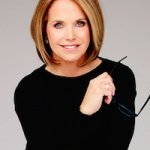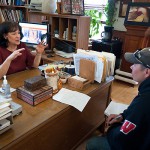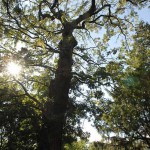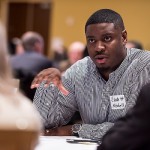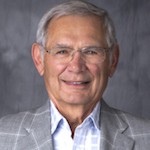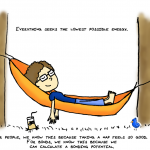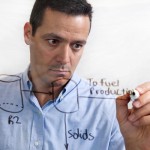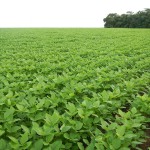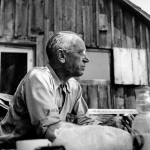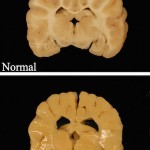Wisconsin Alumni Research Foundation near the top of the patent charts for 2013
In 2013, with 160 patents, the Wisconsin Alumni Research Foundation (WARF) was near the pinnacle of the university patent heap.
Last stand of the President’s Oak: A tree’s life remembered
After a tall and green life, Quercus macrocarpa, better known to friends as the President’s Oak, was taken down on Jan. 14, 2015, following a lengthy illness.
TEAMS VIE FOR CLIMATE QUEST GRAND PRIZE FRIDAY
The Climate Quest competition began almost 10 months ago with a call to action challenging the University of Wisconsin–Madison community to find practical but transformative solutions to climate change and its effects. From 80 submitted ideas, five teams remain. On Friday, the finalists will deliver their final pitches in their quest for the grand prize — support to make their vision a reality.
New $3M distinguished chair at UW–Madison honors influential alumnus
A newly established professorship will allow the University of Wisconsin–Madison to hire new faculty to build upon its widely recognized leadership in chemical and biological engineering. Supported by a $3 million commitment from the Wisconsin Alumni Research Foundation (WARF), the Ernest Micek Distinguished Chair in Chemical and Biological Engineering will honor a UW–Madison graduate with a long record of service to UW–Madison.
No joke: Chemistry thesis transmuted into comic book
As thesis writing approached, University of Wisconsin–Madison graduate student Veronica Berns faced a conundrum. She knew how hard it was to describe her work to friends and family — indeed, anybody outside the tight clan of structural chemists. And that was particularly true since she concentrated on a category of should-be-impossible structures called “quasicrystals.” However, Berns liked drawing and using “normal, English-language words,” and so about a year before graduation, she opted to accompany her traditional Ph.D. thesis with a comic book version.
Yin retirement closes UW–Madison sound localization lab
After nearly 40 years of distinguished teaching and research at the University of Wisconsin–Madison, neuroscience professor Tom Yin has opted to retire, a decision he made more than a year ago when his National Institutes of Health (NIH) grant was up for renewal.
‘Kindness curriculum’ boosts school success in preschoolers
Watch Richard Davidson discuss this project at the 2015 World Economic Forum Annual Meeting in Davos, Switzerland. Over the course of 12 weeks, twice…
Calculating the future of solar-fuel refineries
A team of University of Wisconsin–Madison engineers has developed a new tool to help plot the future of solar fuels. In a paper recently published in the journal Energy & Environmental Science, a team led by chemical and biological engineering Professors Christos Maravelias and George Huber outlined a tool to help engineers better gauge the overall yield, efficiency and costs associated with scaling solar-fuel production processes up into large-scale refineries.
Study shows Brazil’s Soy Moratorium still needed to preserve Amazon
Today, fewer chicken nuggets can trace their roots to cleared Amazon rain forest.
UW–Madison offers free Leopold’s land ethic online course and February event
The University of Wisconsin–Madison will offer its next round of six Massive Open Online Courses beginning Jan. 26 with “The Land Ethic Reclaimed: Perceptive Hunting, Aldo Leopold and Conservation.” MOOCs are free online, noncredit learning experiences that allow people from around the globe to participate. Participants watch educational videos, engage in discussion forums, read articles and often take quizzes or complete educational activities. More than 135,000 registrants from approximately 140 countries and all 50 states signed up for UW–Madison’s previous phase one pilot of four courses.
Media Advisory: UW–Madison collaborates with Wisconsin tribes on obesity, climate change, science education and language preservation
MEDIA ADVISORY1/22/15TO: Media representativesFROM: Meredith McGlone, mcglone2@wisc.eduRE: UW-MADISON COLLABORATES WITH WISCONSIN TRIBES ON OBESITY, CLIMATE CHANGE, SCIENCE EDUCATION AND LANGUAGE PRESERVATION
UW-Madison to participate in national sexual assault climate survey
Taking action in response to concerns about sexual assault, UW–Madison will take part in a national effort to gather data on the campus climate as it relates to sexual violence.
Rare neurological disease shines light on health of essential nerve cells
Ian Duncan is a Scotsman with the iron discipline and stamina of a competitive marathoner, triathlete and cross-country skier. As a neuroscientist at the School of Veterinary Medicine at the University of Wisconsin–Madison, he's applied his tenacity to a rare genetic disorder.
Two Administrative Improvement Award teams will receive supplemental funding from campus
Two teams have been chosen to receive funds that will support initiatives related to projects that won UW–Madison’s 2014 Administrative Improvement Awards. These supplements are a new component of the Administrative Improvement Awards, which were launched in 2013 to recognize the essential role of administrative work and a culture of continuous improvement in the success of university missions. Team recipients of the 2014 awards were eligible to apply for supplemental investment funds.

